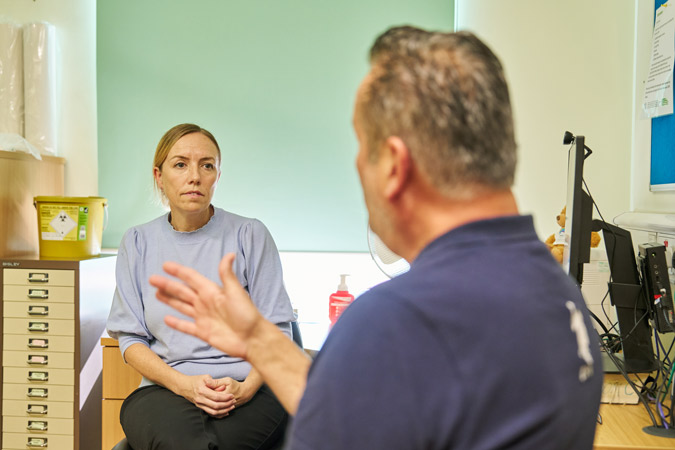Kennedy’s disease is also known as spinal bulbar muscular atrophy (SBMA) and is a rare disorder of the motor neurones, caused by a genetic mutation.
If you are living with or affected by Kennedy's disease, the MND Association is here to support you.
Select from the following options or search for content by need with our:
Care information finder
“I have been diagnosed for more than 10 years and find knowledge of Kennedy’s to be very limited…information can be hard to find.”
What are the basic facts about Kennedy's disease?
If you have Kennedy’s disease, it damages the motor nerves that control voluntary muscle movement and progresses slowly. It leads to weakness, wasting of muscles and hormonal changes. There is currently no known cure, but your symptoms can be managed to improve quality of life and you are likely to live an average life span.
Most people with the disease start to show symptoms when they are 30-60 years old, but it can appear in older or younger people.
Men are usually affected by the symptoms. Most women with the gene do not develop symptoms, but can pass it to their sons or daughters. In rare cases, women do develop symptoms, but these are usually milder than for men. As little is known about the condition in women, further research is ongoing.
- Find out more in our Kennedy's disease booklet.
- For professionals, see An introduction to Kennedy’s disease.
You may come across medical and research terms when reading about Kennedy's - see our page on What do all the words and initials mean?
How do I find out if I have Kennedy's disease?
If your symptoms are assessed by a neurologist, you may at first have the same tests as for MND, as the two diseases have similar symptoms and can be confused. These tests are used to rule out other causes and you can find out more about them on our page - How is MND diagnosed?
However, although there is no single test to diagnose MND, there is a specific genetic test that can identify Kennedy's disease.
What are the symptoms of Kennedy's disease?
Kennedy's disease affects people in different ways. Not everyone develops all of the symptoms and they can be very mild for some. Support can help you achieve the best possible quality of life.
The main symptoms for women are muscle cramps and fatigue, but it is unusual for women to develop any symptoms, even if they carry the gene responsible for the disease.
The symptoms in men are:
- fatigue, making it harder to do the things you want to do
- twitching, with rippling sensations under the skin (known as fasciculations)
- tremors and muscle cramps, which can be uncomfortable
- muscle weakness, with loss of muscle mass (wasting)
- enlarged breast glands, leading to growth of breast tissue
- reduced sex drive, and difficulty getting an erection
- reduced fertility, from hormonal changes
- swallowing difficulties, affecting how you eat and drink
- slurred speech, affecting how you communicate.
Tell us your thoughts on this webpage
Page last updated: 17 February 2025
Next review: February 2027
